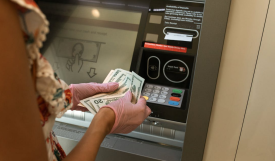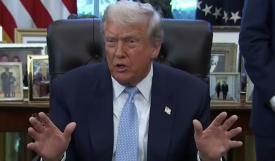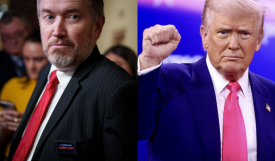New York City Considering Plastic and Paper Shopping Bag Fee : Grocery and Retail Shoppers Could Pay With Environment-Friendly Bill
Soon, New Yorkers might have to pay a 10-cent surcharge for plastic or paper shopping bags at their local supermarket.
A bill introduced by the New York City (NYC) council members on Wednesday is its second attempt at banning the use of both plastic and paper bags. The ban could reduce economic costs for the city and has some supporters, but some find it too expensive for the consumer.
According to supporters, city residents use 5.2 billion disposable bags annually. This costs the city $10 million per year, the Associated Press reported.
"Bags [paper or plastic] get stuck in storm drains, which could lead to flooding; and also these bags litter the beaches," Manhattan Councilwoman Margaret Chin said at a newsconference on City Hall Steps. "These bags cost the city a lot of money."
The 10-cent surcharge, some city officials are saying, could encourage consumers to reduce the use of plastic shopping bags and therefore influence shoppers to opt to bring their own bags. Some backers of the bill say it could help to improve the city's natural environment and save millions of dollars, the New York Business Journal reported. And, the surcharge would not be a tax increase to city revenue, it would perhaps go back to store owners.
There are 19 council members who are already behind the measure, which means only seven more must join them in order to send it to Mayor Bill de Blasio. Councilwoman Chin and city council member Brad Lander are both in support of the measure.
Supermarkets are not the only businesses affected by this measure. The Associated Press reported that grocery stores do supply the vast majority of disposable bags used in the city, but the fee would not be charged to shoppers who use public-assistance programs to buy food. However, the fee could extend to retail stores, but not apply to restaurant deliveries or most street food carts.
Some business owners have argued that the fee could keep shoppers away. CBS New York reported that the "carry-out" bag fee would apply to "markets and bodegas, street vendors selling fruit, vegetables and general merchandise and retail stores including clothing, drug and department stores. But restaurants, and bags for medication at pharmacies and liquor stores would be exempted."
Fernando Mateo, the spokesman for the Bodega Association of the U.S., stated that they support efforts to protect the environment, "but that the city needs to do more by educating people through public service announcements (PSA). Mateo also added that PSAs are perhaps the best way to deter the use of harmful products to the environment which could best teach the uneducated consumer," according to CBS.
De Blasio has not commented on the proposed bill.
Subscribe to Latin Post!
Sign up for our free newsletter for the Latest coverage!
© 2025 Latin Post. All rights reserved. Do not reproduce without permission.















